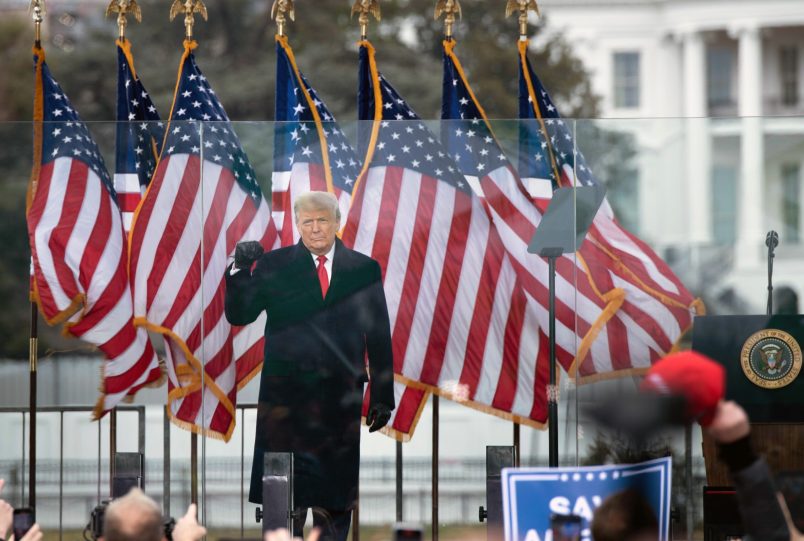In order to understand President Trump’s role in inciting a mob to storm the Capitol — and whether that behavior amounts to impeachable conduct — the events of last Wednesday shouldn’t be seen in a vacuum.
As the House prepares its case for removing the President, former prosecutors, as well as lawyers who advised Democrats in their last impeachment go-around, told TPM that Trump’s earlier efforts to reverse President-Elect Joe Biden’s electoral victory are deeply connected to why and how he riled up the Trump supporters that ransacked the halls of Congress last week.
The impeachment article introduced by House lawmakers earlier this week, which charges Trump with “incitement of insurrection,” references his call to Georgia Secretary of State Brad Raffensperger the weekend before Congress’ certification of the Electoral College. During the call, Trump demanded that Raffensperger “find” just enough votes to allow the President to overcome Biden’s margin of victory in the state.
The Raffensperger call is one of several apparent Trump interventions in Georgia that, in hindsight, appear to be important context for Wednesday’s events. Several days before calling Raffensperger, Trump also called an investigator in the secretary of state’s office and told the investigator to “find the fraud.” And the departure of a U.S. attorney in Atlanta, just two days before Congress was set to certify the Electoral College, now seems relevant to what was happening that day. The White House was reportedly behind U.S. Attorney’s ouster, as Trump was angry that the prosecutor had not launched phony investigations into his conspiracy theories.
Any indication — as trumped up as it was — that there was now an investigation into Georgia’s results would have given “cover” to the congressional lawmakers planning to object to Wednesday’s certification vote, Michael Moore, who served as a U.S. Attorney in Georgia under President Obama, said.
“[Trump] was looking for a way to legitimize what, it seems to me, was a pretty clear plan to delay or eliminate the certification of the electoral college votes,” Moore told TPM.
But to build the case against Trump’s actions last Wednesday, you could actually go much farther back — even to his pre-election rhetoric aimed at convincing his followers that any election he lost was illegitimate, and through all his attempts to dissuade state officials across the country from taking steps that would formalize Biden’s win.
Those events can serve as evidence of what was in Trump’s mind when he took the stage to rile up his supporters and point them towards the Capitol, according to Barry Berke, a New York defense attorney who advised the House on its 2019 impeachment proceedings against Trump.
“You can see his intent, his desperation, because at each step of the way, he tried to prevent his loss in this election,” Berke said. “First at the state level, then by making claims to change the votes, and then at the federal level. So his actions at the end show a desperate man clinging to power with no options but to inspire his followers to interfere with the process to certify his loss.”
Connecting Trump’s earlier election reversal efforts effort the to his behavior on Wednesday is comparable to how prosecutors use so-called “speaking indictments,” said Michael Bromwich, a former DOJ official who, since leaving the Department, has represented opponents of the President. Speaking indictments often provide a narrative of the circumstances that surrounded the alleged crime.
“It’s all of a piece, and in writing the indictment, you would want to put the best morsels demonstrating this course of conduct over a period of time together” Bromwich, who was a federal prosecutor before serving as the Justice Department’s inspector general, said.
Such events could include not just the Georgia-oriented pressure campaign, but the arm-twisting Trump did of officials in other states, and how he sought to disrupt the state-level processes to certify the election.
“It tells an outrageous story, over time, culminating in his speech and the actions that were taken in his name last Wednesday, but not beginning and ending there,” Bromwich said.







It’s important to get this context. From the moment that Trump questioned absentee ballots and rigged the post office, the fix was in. We Dems just outsmarted him.
I sincerely hope that Congress gets deep into the true level of conspiracy that culminates in this insurrection. That includes who in DOJ, the Pentagon, Hill Cops, etc. had prior knowledge and either facilitated or turned a blind eye to the attack on American Democracy. No one should be shielded from scrutiny.
Dems. just worked far harder. This is why Dems. must enact the strongest laws possible to protect and expand the right to vote.
Add the post-riot pleas from Rudes to objecting senators, to the effect “just get us delayed until tomorrow.” The trash-the-Capitol plan, complete with withholding any reinforcements to Capitol Police, now clearly emerging as a stalling tactic.
My take is somewhat different: they relied on yahoos and wink, wink, nudge, nudge instructions to pull off something that takes massive coordination and intelligence.
We got lucky.
Luck is not a strategy.